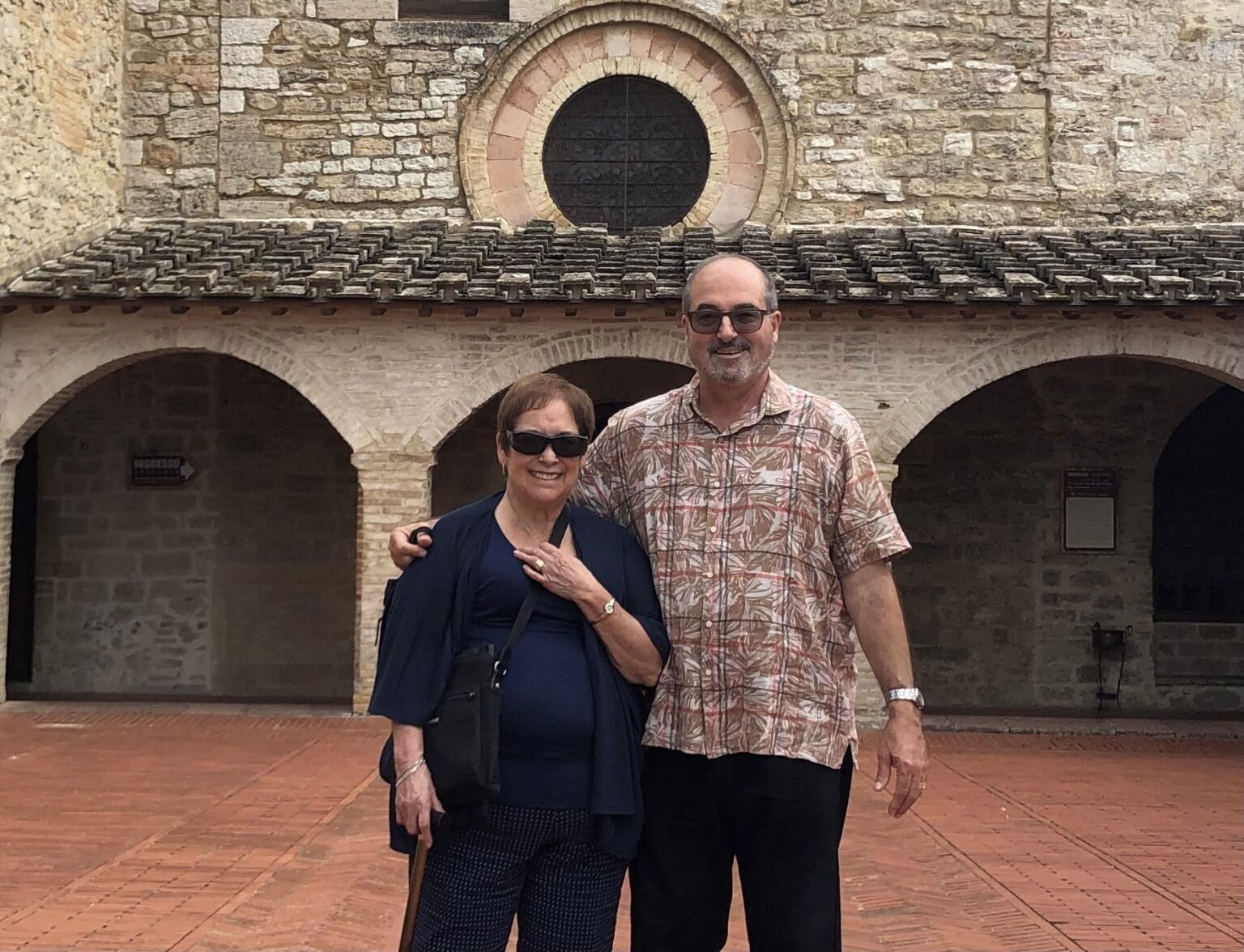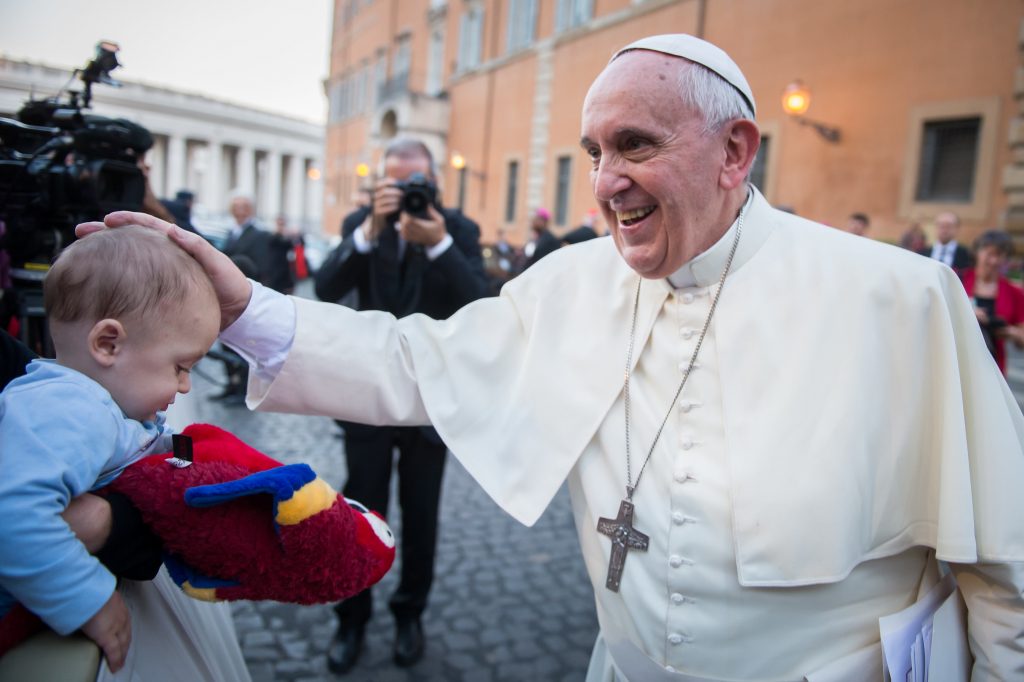Editor’s Note: In these excerpts from a book-length interview conducted by Italian journalist Gianni Valenti, Pope Francis speaks pithily about his approach to mission work. He speaks about the role of the Holy Spirit, the importance of “attraction” and the dangers of “taming Christ” by taking a programmatic or managerial approach to evangelization. “To evangelize,” Pope Francis says, “means delivering Christ’s own testimony in simple and precise words, like the Apostles did.” We publish his comments here because they speak to issues of importance to all Christians.
Holy Father, you said that as a young man you wanted to go to Japan as a missionary. Can we say then that the Pope never became a missionary?
I don’t know. I joined the Jesuits because I was struck by their missionary vocation—of always going to the frontiers. At the time I could not go to Japan. But I have always felt that to proclaim Jesus and his gospel always involves a certain outgoingness and being on the move.
You always repeat: “A church that is on the move.” Many have picked up this expression, and sometimes it seems to have become a hackneyed slogan, used by a growing number of people who spend their time lecturing the church on what she should or should not be.
“A church on the move” is not a fashionable expression that I invented. It is Jesus’ command, who in the Gospel of Mark asks his followers to go into the whole world and preach the gospel “to every creature.” The church is either on the move or she is not church. Either she evangelizes or she is not church. If the church is not on the move, she decays, she becomes something else.
What does a church that does not evangelize and is not in movement become?
It becomes a spiritual association, a multinational that launches ethical and religious initiatives and messages. There is nothing wrong with that, but that is not the church. This is the risk of any static organization in the church. We end up taming Christ. You no longer bear witness to what Christ does, but speak on behalf of a certain idea of Christ, an idea that you have appropriated and domesticated. You organize things, you become the little manager of ecclesial life, where everything happens according to an established plan, to be followed only according to instruction. But the encounter with Christ never happens. The encounter that touched your heart at the beginning doesn’t happen anymore.
Is mission itself an antidote to all this? Is the will and effort to “go out” on mission enough to avoid these distortions?
The mission, the “church on the move,” is not a program, an intention to be carried out by sheer force of will. It is Christ who makes the church go out of herself. In the mission of evangelization, you move because the Holy Spirit pushes you and brings you. And when you get there, you realize that he is already there and is waiting for you. The Spirit of the Lord arrived first. He has already prepared the path for you and is already at work.
In a meeting with the Pontifical Missionary Societies, you suggested that they read the Acts of the Apostles, as a habitual text to pray over.
The protagonist of the Acts of the Apostles is not the Apostles. The protagonist is the Holy Spirit. The Apostles are the first to recognize him and testify to him. When they communicate the decisions established by the Council of Jerusalem to the community in Antioch, they write: “We have decided, the Holy Spirit and us.” They realistically acknowledge that it was the Lord who daily added to their number “those who were saved,” rather than the persuasive efforts of men.
And is it the same today as it was back then? Has nothing changed?
The experience of the Apostles is like a paradigm that is always valid. Just think of how things happen spontaneously in the Acts of the Apostles, without coercion. It is a human story, in which the disciples always arrive afterwards, they always arrive after the Holy Spirit has already acted. He prepares and works on hearts. He upsets their plans. It is he who accompanies them, guides them and comforts them in all the circumstances they find themselves living. When problems and persecutions come, the Holy Spirit works there too in an even more surprising way with his comfort, his consolations, as happens after the first martyrdom, that of Saint Stephen.
What happens next?
A time of persecution begins, and many disciples flee Jerusalem, going to Judea and Samaria. And there, while they are dispersed and fugitives, they begin to evangelize, though they are alone and without the Apostles who remained in Jerusalem. They are baptized and the Holy Spirit gives them apostolic courage. There we see for the first time that baptism is enough to become evangelizers. That’s what mission is. Mission is his work. There’s no point in getting agitated. There’s no need for us to get organized, no need to scream, no need for gimmicks or stratagems. All we need to do is ask to be able to repeat the experience today that makes us say, “We have decided, the Holy Spirit and us.”
And without this experience, what do the calls for missionary mobilization mean?
Without the Spirit, wanting to do mission becomes something else. It becomes, I would say, a plan to conquer, the pretext that we are conquering something. A religious, or perhaps an ideological conquest, perhaps carried out even with good intentions. But it’s another thing.
Quoting Pope Benedict XVI, you often repeat that the church grows by “attraction.” What do you mean? Who attracts? Who is attracted?
Jesus says it in the Gospel of John, “When I am lifted up from the earth, I will draw everyone to myself.” And in the same Gospel, he also says: “No one can come to me unless the Father who sent me draw him.” The church has always recognized that this is the proper form of every movement that brings us closer to Jesus and the gospel. It is not a conviction, a rationalization, it’s not taking a position; not a pressure, or a constraint. It is always an attraction. The Prophet Jeremiah already said, “You duped me, O Lord, and I let myself be duped.” And this applies to the Apostles, to the missionaries, and to their work.
How does what you have just described take place?
The Lord’s mandate to go out and evangelize comes from within, by falling in love, by loving attraction. One does not follow Christ, and even less become an evangelizer, because of a decision made sitting around a table or by one’s own activism. Even missionary thrust can be fruitful only if it takes place within this attraction and transmits it to others.
What is the meaning of these words with respect to the mission and the proclamation of the gospel?
It means that if you have been attracted by Christ, if you move and do things because you are attracted by Christ, others will notice it without effort. There is no need to prove it, let alone flaunt it. Instead, anyone who thinks he or she is the protagonist or manager of the mission, with all the best intentions and declarations of purpose, often ends up attracting no one.
In the apostolic exhortation Evangelii Gaudium (The Joy of the Gospel), you recognize that all this can give us a certain vertigo. It is like those who dive into the ocean not knowing what to expect. What did you want to suggest with this image? Do these words also concern mission?
Mission is not a tried and tested company plan. Neither is it a public spectacle organized to flaunt how many people are associated with it thanks to our marketing. The Holy Spirit works as he wills, when he wills and where he wills. And this can cause a certain vertigo.
Yet the high point of freedom rests precisely in this letting oneself be carried by the Spirit, renouncing the need to calculate and control everything. This is precisely how we imitate Christ himself, who in the mystery of his resurrection learned to rest in the tenderness of the Father’s embrace.
Mission’s mysterious fruitfulness does not consist in our intentions, in our methods, in our impulses and in our initiatives, but rests precisely in this vertigo: the vertigo we perceive when we hear Jesus’ words: “without me you can do nothing.”
You also often repeat that the church grows “by witnessing.” What are you trying to suggest by insisting on this?
The fact that attraction makes us witnesses. This witness testifies to what the work of Christ and his Spirit have really accomplished in our life. After his resurrection, it is Christ himself who reveals himself to the Apostles. It is he who makes them witnesses. In addition, this witness is not self-serving. We are witnesses to the Lord’s works.
Something else you repeat often, in this case in a negative sense: the church does not grow through proselytizing, and the mission of the church is not proselytism. Why do you insist on this so much? Is it to maintain good relations with other churches and dialogue with other religious traditions?
The problem with proselytism is not only the fact that it contradicts the ecumenical journey and interreligious dialogue. There is proselytism wherever there is the idea of making the church grow by putting less emphasis on this attraction on the part of Christ and the work of the Spirit, focusing everything on any type of “wise discourse.” Therefore, proselytism first of all cuts out Christ himself and the Holy Spirit from the mission, even when we claim to speak and act nominally in Christ’s name. Proselytism is always violent by nature, even when it is hidden or exercised with white gloves. It does not tolerate the freedom and graciousness with which faith can be transmitted from person to person by grace. This is why proselytism is not only something of the past, of bygone colonialist times, or conversions forced or bought with the promise of material advantages. Proselytism can also exist today even in parishes, communities, movements, religious congregations.
So what does it mean to evangelize?
To evangelize means delivering Christ’s own testimony in simple and precise words, like the Apostles did. But there is no need to invent persuasive discourses. The proclamation of the gospel can even be whispered, but it always passes through the overwhelming power of the scandal of the cross. And it has always followed the path indicated in the letter of the Apostle Peter, which consists in simply “providing reasons” of one’s hope to others, a hope that remains a scandal and foolishness in the eyes of the world.
How do we recognize a Christian missionary?
A distinctive feature is that of acting as facilitators, and not as controllers of the faith. Facilitating, making easy, without us placing obstacles to Jesus’ desire to embrace everyone, to heal everyone, to save everyone, not being selective, not imposing “pastoral tariffs,” not playing the part of the guard at the door controlling who has the right to enter. I remember parish priests and communities in Buenos Aires who set up many initiatives to facilitate access to baptism. In the last few years, they realized the number was growing of those not being baptized for various reasons, even sociological ones, and they wanted to remind everyone that being baptized is something simple, that everyone can request it, for themselves and for their children. The path taken by those parish priests and those communities had one objective: not to add burdens, not to make claims, to remove any cultural, psychological or practical difficulties that could push people to postpone or drop the intention to baptize their own children.
Some tend to drive a wedge between the transparent proclamation of the faith and social work. They say that we must not reduce mission to a type of social activity. Is that a legitimate concern?
Everything that is within the scope of the Beatitudes and the works of mercy is in agreement with mission, is already proclamation, is already mission. The church is not an NGO, the church is something else. But the church is also a field hospital, where everyone is welcome, as they are, where everyone’s wounds are healed. And this is part of her mission. Everything depends on the love that moves the heart of those who do things. If a missionary helps dig a well in Mozambique because he is aware that those he baptizes and evangelizes need it, how can it be said that that work is separate from evangelization?
Today what are the new focusses and sensitivities to put into practice in the processes aimed at making evangelization fruitful in the various social and cultural contexts?
Christianity does not embrace only one cultural model. As John Paul II acknowledged, “While remaining completely true to itself, with unswerving fidelity to the proclamation of the gospel and the tradition of the church, Christianity will also reflect the different faces of the cultures and peoples in which it is received and takes root.” The Holy Spirit embellishes the church, with the new languages of persons and communities that embrace the gospel. Thus the church, taking up the values of different cultures, becomes “sponsa ornate monilibus suis,” “the bride bedecked with her jewels,” of which the Prophet Isaiah speaks. It is true that some cultures have been closely linked to the preaching of the gospel and to the development of Christian thought. But in the period we are living it becomes even more urgent to bear in mind that the revealed message is not identified with a particular culture. And when meeting new cultures, or cultures that have not accepted the Christian proclamation, we must not try to impose a determined cultural form together with the evangelical proposition. Today, in missionary work as well, it is even more important not to carry heavy baggage.
Mission and martyrdom. You have often recalled the intimate bond uniting these two realities.
In Christian life the realities of martyrdom and evangelization both have the same origin, the same source: when the love of God poured into our hearts by the Holy Spirit gives strength, courage and consolation. Martyrdom is the maximum expression of the recognition of and the testimony rendered to Christ, which represents the fulfillment of mission, of apostolic work. I always think of the Coptic brothers slaughtered in Libya, who quietly uttered Jesus’ name while they were being beheaded. I think of Saint Mother Teresa’s sisters murdered in Yemen, while they were taking care of Muslim patients in a home for disabled elderly people. The sisters were wearing work aprons over their religious habits when they were killed. They are all victors, not victims. And their martyrdom, to the point of the shedding of blood, illuminates the martyrdom that everyone can suffer in everyday life, with the witness rendered to Christ every day. It’s what can be observed when visiting old missionaries in their nursing homes. They are often battered by the life they have had. A missionary told me that many of them lose their memories and no longer remember anything about the good they did. “But it does not matter,” he told me, “because the Lord remembers it very well.”
(GV) (Agenzia Fides, 4/11/2019)
Credit: The Pope and Mission: “Without Jesus We Can Do Nothing” by Gianni Valenti with Fides News Agency is licensed under http://creativecommons.org/licenses/by/4.0/deed.en. It has been edited slightly from the original.




Responses
Nancy Grams says:
March 24th, 2020 at 11:41 PM
Beautiful, inspiring, and truly goes to the heart of our life in Christ in the People of Praise...
Thank you for publishing this in the Vine and Branches.